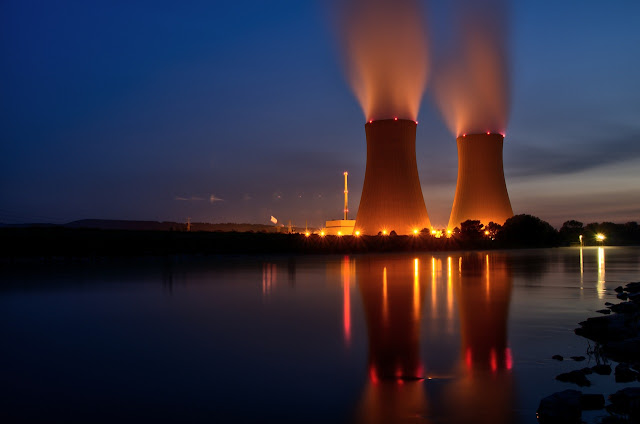 |
| Nuclear Energy Power Plant/Credit: Wostemme |
Nuclear energy plays a crucial role in meeting the world's growing energy demands while minimizing greenhouse gas emissions. As a student, it is important to be aware of the latest developments in nuclear energy, both globally and in India. This note provides an overview of nuclear energy, its advantages, challenges, and recent developments in the field.
I. Understanding Nuclear Energy
Definition:
Nuclear energy is derived from the controlled release of energy by nuclear reactions, either through nuclear fission or fusion processes.
Read More: Nuclear Fission and Fusion
Advantages of Nuclear Energy:
a. Clean Energy: Nuclear power generates electricity without releasing significant amounts of greenhouse gases, aiding in the fight against climate change.
b. High Energy Density: Nuclear energy has a high energy density, which means a small amount of fuel can generate large amounts of electricity.
c. Baseload Power: Nuclear power plants provide a stable and reliable source of electricity, operating continuously for extended periods.
d. Energy Security: Nuclear energy reduces dependence on fossil fuel imports and enhances energy security.
II. Global Developments in Nuclear Energy:
Advanced Reactor Technologies:
a. Small Modular Reactors (SMRs): SMRs offer advantages such as enhanced safety features, flexibility, and easier deployment, making them a promising technology for the future.
b. Generation IV Reactors: These next-generation reactors aim to improve efficiency, safety, and sustainability, with designs like molten salt reactors and high-temperature gas-cooled reactors.
Nuclear Fusion:
a. ITER Project: The International Thermonuclear Experimental Reactor (ITER) in France is a collaborative effort to achieve controlled nuclear fusion. Successful fusion could provide an abundant and clean energy source in the future.
Nuclear Waste Management:
a. Advanced Waste Management Techniques: Various countries are researching advanced techniques for nuclear waste management, including advanced reprocessing and geological repositories.
III. Nuclear Energy in India:
India's Nuclear Power Program:
a. India has a three-stage nuclear power program: Pressurized Heavy Water Reactor (PHWR), Fast Breeder Reactor (FBR), and Advanced Heavy Water Reactor (AHWR).
b. PHWR Technology: India has a significant number of PHWRs, which use natural uranium as fuel and heavy water as a moderator and coolant.
Recent Developments in India:
a. Kudankulam Nuclear Power Plant: It is India's largest nuclear power station and operates VVER-1000 reactors with Russian collaboration.
b. Nuclear Cooperation Agreements: India has signed nuclear cooperation agreements with various countries, including the US, France, Russia, and Australia, to enhance nuclear energy cooperation.
Expansion Plans:
a. India aims to increase its nuclear energy capacity by constructing new reactors, both indigenous and with international collaboration.
b. Thorium-based Reactors: India is actively researching and developing thorium-based reactors, leveraging its vast thorium reserves.
Nuclear energy continues to evolve as a viable solution for sustainable and clean electricity generation. As a UPSC student, staying updated with the latest developments in nuclear energy, both in India and globally, will enable you to understand the challenges, opportunities, and potential of this field.
